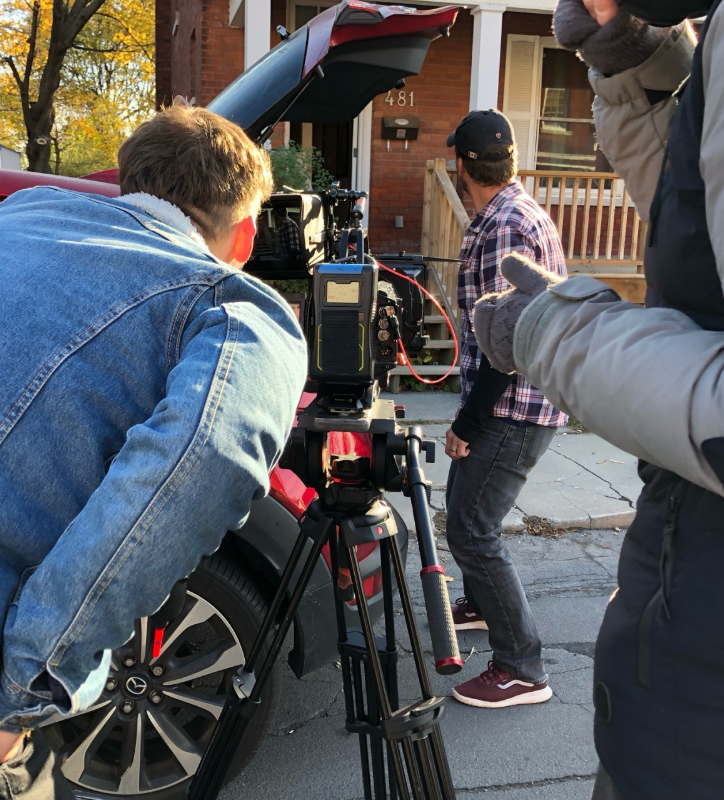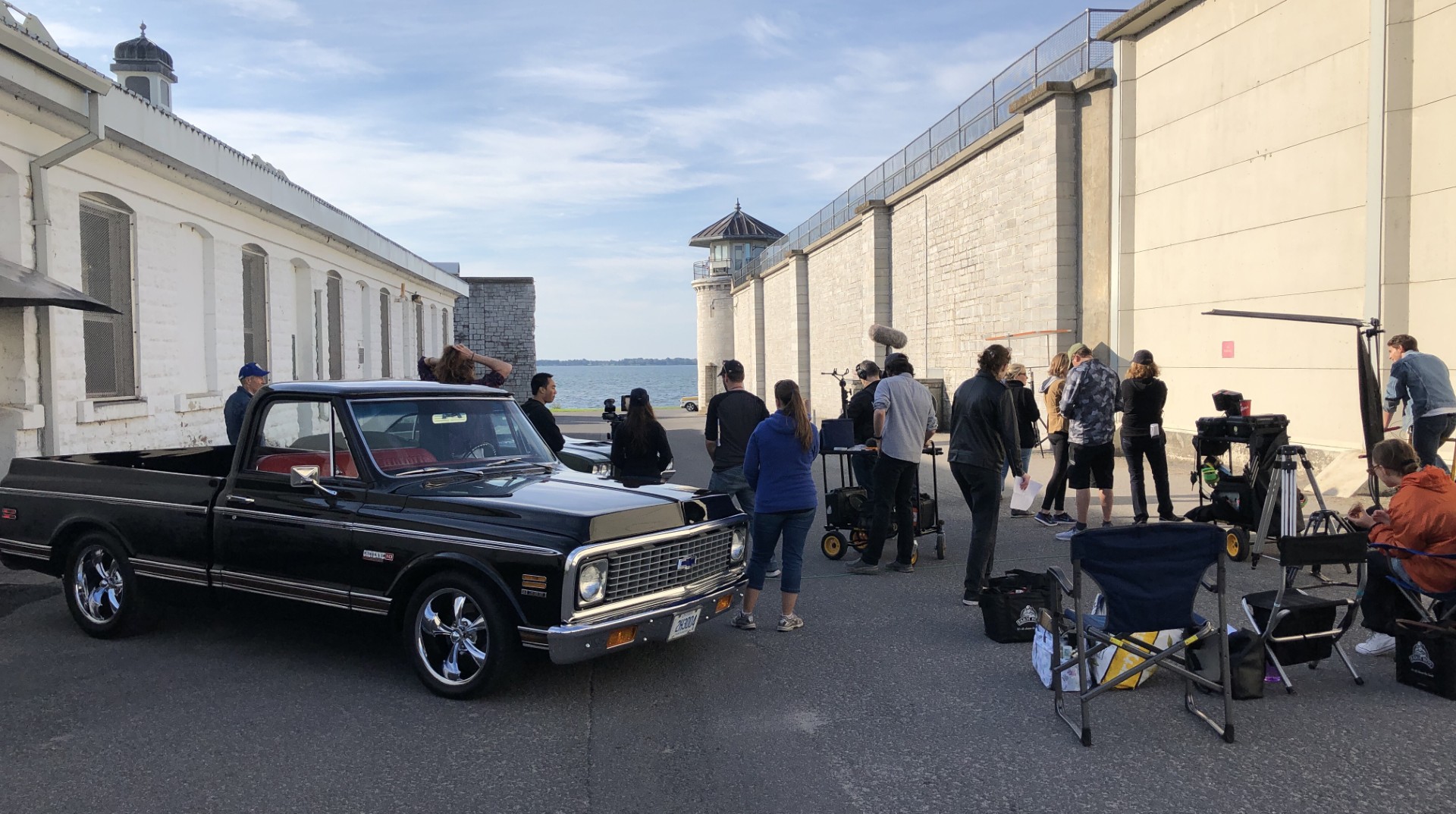Experiential learning is reshaping how students connect the classroom to the real world—and leading this charge are Alex Jansen (Queen’s Department of Film and Media, founder of Kingston Canadian Film Festival and Pop Sandbox) and Andrew Whiteman (Pop Sandbox). With deep roots in the production and creative industries, Alex and Andrew are delivering the latest iteration of a replicable, community-driven training model embedded in Alex’s FILM457/458 Practicum Course, which prepares students for today’s rapidly evolving job market. The ultimate goal of this ongoing project is to execute a union-standard training production that immerses students in real-world set workflows under professional mentorship.
Backed by an Amplify Grant from the Centre for Community Engagement and Social Change (CCESC), their project brings together academic learning and industry insight in meaningful, hands-on ways. The Amplify Grant helps faculty expand the reach of their community-engaged research by funding small-scale, high-impact initiatives. It can also complement existing projects supported by bodies like SSHRC.
This is a glimpse into the future of education, where learning doesn’t just happen in lecture halls, but out in the world. Alex and Andrew will kick off the experience with a Set PA Fundamentals Workshop delivered by the Directors Guild of Canada – Ontario (DGC-O) to prepare students for their subsequent on-set roles. From there, the initiative combines classroom training with hands-on production experience. Students will engage in bi-weekly script breakdowns, scheduling, production planning, preparation and tasks with professional mentors en route to a full industry-standard on-set production.
The next training production is scheduled for Fall 2025, with student onboarding and workshops beginning earlier in the term.
Filling in a Gap: An Organic Startup
The vision behind the Training Production Lab was born from a clear and growing need: to create more tangible, practical entry points for students looking to break into the film and media industry.

Alex started the Practicum course in 2019, while serving as the founding Commissioner of a then entirely new Kingston Film Office, where he developed the infrastructure to attract and support film and media production locally. This included the creation of training programs, incentive programs and first-time access to key locations such as Kingston Penitentiary. By 2021, this new sector generated more than $5 million in direct local spend annually despite the pandemic. The Film Office hosted more than a dozen major productions, including Star Trek: Discovery, DC’s Titans, Reacher, Locke & Key, and the Mayor of Kingstown. Under his leadership, the Film Office had also begun partnering on a half dozen lower-budget end-to-end feature film productions, shot entirely in Kingston with a majority local crew, many of whom were students. By 2022, when Jansen moved on, the Film Office was nominated for Top Film Commission globally by the Location Managers Guild International (LMGI).
Alex jump-started his career by starting the Kingston Canadian Film Festival in 2001 while still a student at Queen’s and running the Screening Room cinema. He quickly moved into film producing, then distribution with Mongrel Media, before starting his own multimedia production company, Pop Sandbox. His return to Queen’s in 2012, this time as an instructor, presented a unique opportunity. He wanted to teach the kind of course he wished had existed when he was a student: one that demystified the film industry and bridged academic theory with industry-standard practice.
Alex started by developing a top-rated FILM450 Business of Media Course, where students learn the ins and outs of producing and working within the media industry. Drawing from both industry standards and his own professional experience, Alex invites top industry and alumni guests to speak with students about everything from the process of pitching to production, post-production, distribution and marketing as well as career paths. This course culminates in a field trip to Toronto, where students have the opportunity to visit studios, networks and key organizations such as the CBC, CTV, Cinespace, iQiyi and the Toronto International Film Festival. Over time, his teachings have continually evolved into a more robust program, always built around experiential learning and real-world application.
 Andrew is an Associate Producer and Researcher on the Training Production Lab, contributing a focus on experiential learning design, partnership development, and applied storytelling. At Queen’s, Andrew has helped facilitate professional collaborations with media and nonprofit organizations such as Underknown and Habits for a Better World within the Practicum, mentoring students as they developed science-based pitch decks, professional portfolios, and presentations for global stakeholders. For the upcoming Amplify-supported phase, Andrew has helped with production planning, student engagement, and the early framework for evaluating the success of the program and how knowledge will be mobilized thereafter.
Andrew is an Associate Producer and Researcher on the Training Production Lab, contributing a focus on experiential learning design, partnership development, and applied storytelling. At Queen’s, Andrew has helped facilitate professional collaborations with media and nonprofit organizations such as Underknown and Habits for a Better World within the Practicum, mentoring students as they developed science-based pitch decks, professional portfolios, and presentations for global stakeholders. For the upcoming Amplify-supported phase, Andrew has helped with production planning, student engagement, and the early framework for evaluating the success of the program and how knowledge will be mobilized thereafter.
Departures from Theory-Based Training Programs
While theory-based learning is essential groundwork for further understanding, this program allows students to gain real-world experience in film. The program seeks to fill a gap in traditional education models by addressing the challenges associated with entrance into the film industry and receiving high-end union grade work experiences. While guerrilla-style short films are more common in a student setting, the Training Production Lab allows students to expand their experience into longer productions with industry-standard workflows, including standardized safety protocols, call sheets, departmental structure, and chain of command. Exposure to these elements allows students to gain real, employable skills in the industry, understand how studio productions function, and experience a professional work environment in the film industry.
The latest Training Production Lab within the Practicum Course was designed with that exact vision in mind. It immerses students in real-world productions from start to finish, offering them a rare chance to work on professional film sets during their December or February break. Participants are assigned to the departments they’re most interested in—whether that’s camera, sound, production design, or beyond—and are embedded into the flow of a live production.

Community-Driven, Alumni-Led
This project exemplifies a community-engaged model of learning by centering alumni mentorships, local collaborations, and ethical production practices. Each department is led by alumni, offering students hands-on mentorship and opportunities that would not typically be available outside larger markets like Toronto. Drawing on strong ties within the Queen’s and Kingston communities, the program partners with organizations such as the Kingston Canadian Film Festival and local production companies like Visual Menace.
From the outset, the program is intentionally designed as a safe and supportive environment. Department heads are not only experts in their fields but also dedicated mentors. While the film industry is often criticized for unsafe and exploitative conditions, this project importantly teaches and upholds rigorous legal and ethical standards, including insurance coverage, fair labour conditions, and protections for non-union members. These practices ensure the safety and well-being of both students and the broader community.
The program further serves to circumvent systemic barriers that can make it difficult to succeed. For many new grads and young professionals, the expectation is that interns work for free, and there is no guarantee they will receive the technical training they need to succeed in their future. Alternatively, the program offers students a stipend for their participation in the production. This allows students to gain experience while also receiving remuneration through the Experience Ventures program, opening experiential opportunities to lower-income students, while ensuring all participants are acknowledged for their labour. The Canadian film industry is also fraught with challenges for international students or those without citizenship due to tax credit structures tied to residency. The experience afforded by the program allows international students to receive training, and experience that can support their success in the industry.
Significant Takeaways
Some of the most significant takeaways from this program are the increased access and career success for students entering the film industry. Since introducing hands-on practicums and integrating industry into courses like The Business of Media and the Practicum, record numbers of students have landed industry jobs and joined union programs like IATSE’s competitive camera training program, which used to be rare. The program is getting record numbers of students not landing jobs in the industry and building careers.
"Film450: The Business of Film and Media, taught by Alex Jansen, was an extremely valuable course in the development of my professional career in the film industry. This course provided me with so many connections and opportunities, and Alex’s hands-on approach to projects and assignments allowed me to truly experience what working in the screen industries would be like. If you’re considering a career in film, TV, or media production, I can’t recommend this course enough.” - Matthew Ing, Artsci’22
These opportunities help students accumulate the required on-set hours to qualify for union membership. Many alumni are now building sustainable careers in film—a shift from the past, when even the most capable Queen’s graduates sometimes lacked the connections and access needed to enter the industry. This program bridges that gap, providing students with clear, supported pathways into the careers they’re passionate about.
Amplify Grant Allocation: Laying the Groundwork
To build out the program’s infrastructure and keep it accessible, Alex and Andrew are looking to draw on further partnerships with SSHRC and Experience Ventures. These collaborations will help secure funding and support students.
The Amplify Grant, awarded to Alex and Andrew, will support foundational elements of this ambitious program, most notably, training and workshops. These are not ancillary; they are critical to student success. Without the support of the Amplify Grant, core components of the program, such as captioning, script printing, workshop materials, and essential training infrastructure, would not have been feasible for the project. This important funding has enabled other supports, such as stipends through Experience Ventures and in-kind technical contributions from Pop Sandbox, to scale meaningfully and align with the broader goals of the Structured Training Production Lab.
While this represents just one component of a much larger initiative, it reflects the program’s holistic approach to equipping students for future success. These initiatives not only enrich student learning but demonstrate a scalable model of community-engaged education that could benefit disciplines far beyond the creative industries.